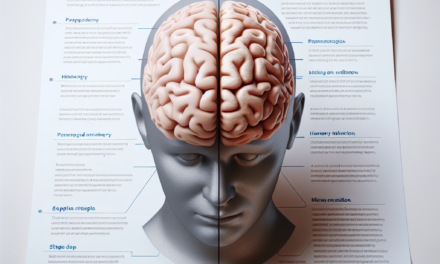The Impact of Excessive Sleep on Mental Health
Sleep is a fundamental aspect of human health, playing a crucial role in physical, emotional, and cognitive well-being. While the importance of adequate sleep is widely recognized, the effects of excessive sleep—often referred to as hypersomnia—are less understood. This article delves into the impact of excessive sleep on mental health, exploring its causes, symptoms, and the intricate relationship between sleep duration and psychological well-being.
Understanding Excessive Sleep: Definitions and Causes
Excessive sleep is generally defined as sleeping more than the recommended amount of 7-9 hours per night for adults. While some individuals may require more sleep due to specific health conditions or lifestyle factors, consistently sleeping beyond this range can lead to various mental health issues.
Several factors contribute to excessive sleep, including:
- Medical Conditions: Conditions such as sleep apnea, depression, and chronic fatigue syndrome can lead to prolonged sleep durations.
- Medications: Certain medications, particularly those used to treat anxiety and depression, can induce drowsiness and increase sleep duration.
- Lifestyle Factors: Sedentary lifestyles, poor diet, and lack of physical activity can contribute to excessive sleep.
- Psychological Factors: Stress, anxiety, and depression can lead to changes in sleep patterns, often resulting in longer sleep durations.
Understanding the underlying causes of excessive sleep is crucial for addressing its impact on mental health. For instance, individuals with depression may find themselves sleeping excessively as a way to escape their feelings, creating a vicious cycle that exacerbates their condition.
The Link Between Excessive Sleep and Depression
One of the most significant mental health issues associated with excessive sleep is depression. Research indicates a bidirectional relationship between sleep and depression, where each can exacerbate the other. Individuals suffering from depression often report increased sleep duration, while those who sleep excessively may be at a higher risk of developing depressive symptoms.
Several studies have highlighted this connection:
- A study published in the journal Sleep found that individuals who reported sleeping more than 9 hours per night had a 50% higher risk of developing depression compared to those who slept 7-8 hours.
- Another study in the American Journal of Psychiatry indicated that excessive sleep could be a symptom of underlying depression rather than a cause, suggesting that addressing the depressive symptoms may help regulate sleep patterns.
Excessive sleep can also lead to feelings of lethargy and decreased motivation, further contributing to depressive symptoms. Individuals may find it challenging to engage in daily activities, leading to social withdrawal and isolation, which can worsen their mental health.
Moreover, the quality of sleep is just as important as the quantity. Excessive sleep does not guarantee restorative sleep; individuals may experience fragmented sleep patterns that prevent them from achieving the deep, restorative stages of sleep necessary for mental health. This can lead to cognitive impairments, such as difficulty concentrating and memory issues, which are often associated with depression.
Excessive Sleep and Anxiety Disorders
Anxiety disorders are another area where excessive sleep can have detrimental effects. While some individuals may use sleep as a coping mechanism to escape anxiety, excessive sleep can lead to increased feelings of anxiety and stress.
Research has shown that:
- Individuals with generalized anxiety disorder (GAD) often report sleep disturbances, including excessive sleep, as a symptom of their condition.
- A study published in the Journal of Clinical Psychiatry found that individuals with anxiety disorders who slept more than 9 hours per night experienced higher levels of anxiety compared to those who maintained a regular sleep schedule.
Excessive sleep can create a cycle of anxiety where individuals feel guilty about their sleep habits, leading to increased stress and anxiety levels. This cycle can be particularly pronounced in individuals who are already predisposed to anxiety disorders.
Furthermore, excessive sleep can lead to a lack of engagement in daily activities, which can exacerbate feelings of anxiety. When individuals spend excessive time in bed, they may miss out on opportunities for social interaction and physical activity, both of which are essential for managing anxiety. The lack of structure in their day can also contribute to feelings of restlessness and unease.
Cognitive Impairments Associated with Excessive Sleep
Excessive sleep can have profound effects on cognitive functioning. While sleep is essential for cognitive processes such as memory consolidation and problem-solving, too much sleep can lead to cognitive impairments that affect daily functioning.
Research indicates that:
- Individuals who sleep excessively may experience difficulties with attention, memory, and executive functioning.
- A study published in the Journal of Sleep Research found that individuals who reported sleeping more than 9 hours per night performed worse on cognitive tests compared to those who slept 7-8 hours.
These cognitive impairments can manifest in various ways:
- Memory Issues: Excessive sleep can lead to difficulties in forming new memories and recalling information, which can impact academic and professional performance.
- Attention Deficits: Individuals may find it challenging to concentrate on tasks, leading to decreased productivity and increased frustration.
- Decision-Making Challenges: Cognitive impairments can hinder an individual’s ability to make sound decisions, affecting both personal and professional aspects of life.
Moreover, excessive sleep can lead to a phenomenon known as “sleep inertia,” where individuals feel groggy and disoriented upon waking. This can further impair cognitive functioning and lead to difficulties in transitioning to daily activities.
Social Implications of Excessive Sleep
The social implications of excessive sleep can be significant, affecting relationships, work performance, and overall quality of life. Individuals who sleep excessively may find themselves withdrawing from social interactions, leading to feelings of isolation and loneliness.
Some key social implications include:
- Relationship Strain: Excessive sleep can lead to misunderstandings and conflicts in relationships, as partners may feel neglected or frustrated by the individual’s sleep habits.
- Work Performance: Individuals who sleep excessively may struggle with punctuality and productivity, leading to potential job loss or career stagnation.
- Social Isolation: The tendency to sleep excessively can lead to missed social events and opportunities for connection, exacerbating feelings of loneliness and depression.
Additionally, societal perceptions of excessive sleep can contribute to stigma. Individuals who sleep more than the average may be viewed as lazy or unmotivated, leading to further feelings of shame and guilt. This stigma can prevent individuals from seeking help or discussing their sleep issues with others, perpetuating the cycle of excessive sleep and mental health challenges.
Conclusion: Finding Balance for Better Mental Health
The impact of excessive sleep on mental health is a complex issue that requires careful consideration. While sleep is essential for overall well-being, excessive sleep can lead to a range of mental health challenges, including depression, anxiety, cognitive impairments, and social isolation.
To promote better mental health, it is crucial to find a balance in sleep duration. Here are some key takeaways:
- Understanding the underlying causes of excessive sleep is essential for addressing its impact on mental health.
- Recognizing the bidirectional relationship between sleep and mental health can help individuals seek appropriate treatment for both issues.
- Engaging in regular physical activity, maintaining a balanced diet, and practicing good sleep hygiene can help regulate sleep patterns and improve mental health.
- Seeking professional help when experiencing excessive sleep or related mental health issues is vital for recovery and well-being.
In conclusion, while sleep is a necessary component of health, excessive sleep can have detrimental effects on mental health. By understanding the complexities of this relationship, individuals can take proactive steps to improve their sleep habits and overall mental well-being.




